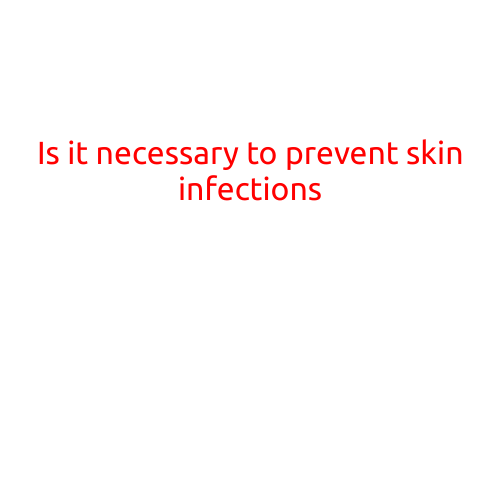
Is it Necessary to Prevent Skin Infections?
Skin infections are a common occurrence in today’s world, and they can be caused by a variety of factors, including bacteria, viruses, and fungi. These infections can range from mild to severe and can cause a range of symptoms, from redness and swelling to pus and blisters. According to the World Health Organization (WHO), skin infections are a major public health concern, and it’s essential to prevent them to maintain good health. But is it necessary to prevent skin infections? Let’s explore the answer.
Why is it Important to Prevent Skin Infections?
There are many reasons why preventing skin infections is crucial. Here are a few:
- Prevention of Complications: Skin infections can lead to serious complications if left untreated. For example, MRSA (methicillin-resistant Staphylococcus aureus) infections can spread to the bloodstream, causing sepsis, which can be life-threatening.
- Scarring and Disfigurement: Skin infections can cause permanent scarring and disfigurement, which can have a significant impact on a person’s quality of life.
- Increased Risk of Bacterial Resistance: Overuse of antibiotics to treat skin infections can lead to the development of antibiotic-resistant bacteria, making it more challenging to treat future infections.
- Higher Risk of Deep Tissue Infections: Skin infections can increase the risk of developing deep tissue infections, such as cellulitis, which can spread to other parts of the body.
How to Prevent Skin Infections?
Fortunately, there are many ways to prevent skin infections. Here are a few:
- Maintain Good Hygiene: Wash your hands frequently with soap and water, especially after using the bathroom or before eating.
- Keep Wounds Clean and Dry: Clean and dry wounds regularly to prevent bacteria from growing.
- Cover Open Wounds: Cover open wounds with bandages or dressings to prevent bacterial contamination.
- Avoid Sharing Personal Items: Avoid sharing personal items, such as towels, razors, or makeup, to prevent the spread of infection.
- Wear Protective Clothing: Wear protective clothing, such as gloves and masks, when caring for someone with an infection.
- Get Vaccinated: Get vaccinated against diseases that can cause skin infections, such as HPV and hepatitis B.
- Avoid Close Contact with Infected Individuals: Avoid close contact with individuals who have an infection to prevent the spread of infection.
Conclusion
In conclusion, preventing skin infections is crucial to maintain good health and prevent complications. While skin infections are a common occurrence, they can be prevented by maintaining good hygiene, keeping wounds clean and dry, covering open wounds, and avoiding close contact with infected individuals. If you do contract a skin infection, it’s essential to seek medical attention promptly and follow your healthcare provider’s instructions to prevent complications and ensure a full recovery.





